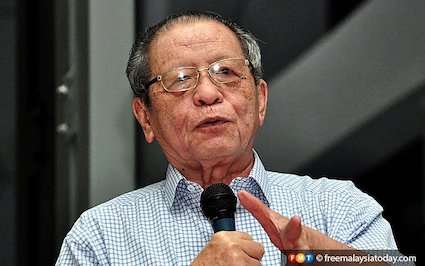Malaysia was never meant to be an Islamic country, says Kit Siang

(Borneo Post) – Democratic Action Party (DAP) veteran parliamentarian leader Lim Kit Siang has concurred with de-facto law minister Datuk Seri Wan Junaidi Tuanku Jaafar that the recent proposal to have a new Malaysia Agreement is ‘nonsense’.
The Iskandar Puteri MP agreed that the proposal by Barisan Nasional deputy chairman Datuk Seri Mohamad Hassan is ‘nonsense’ as the existing Malaysia Agreement 1963 (MA63) is a commitment that had been agreed upon by all parties for the formation of Malaysia.
“I also agree with Wan Junaidi that what is being demanded by Sabah and Sarawak now is not to renegotiate the existing agreement but the fulfilment of matters that have already been agreed upon,” he said in a statement today.
Lim recalled that former Inspector-General of Police (IGP) Tan Sri Abdul Rahim Mohd Noor had warned Umno that concessions to PAS, particularly over the controversial Islamic penal code hudud, could lose its Sabah and Sarawak support.
“I am not shy to declare that I appreciated his warning that the federal government would not only lose the goodwill and support of the East Malaysian states, the latter may even agitate to leave the Federation if the government submitted to PAS’ demands to implement hudud, just to ensure that Umno remained in power,” he said.
He said Abdul Rahim had stressed that the Federation of Malaysia was never meant to be an Islamic country because if it was, Sabah and Sarawak would never have agreed to it.
The former IGP also said when the idea of Malaysia was mooted, religion was the main issue addressed by the Cobbold Commission, pointed out Lim.
“The former IGP’s warning should be given serious consideration as it concerns one of the bedrock nation-building principles of the country as well as one of the fundamental terms and conditions for Sarawak and Sabah’s agreement to form the Malaysian Federation in 1963.
“Malaysia will mark its 60th anniversary since its formation in 1963, and I would call for an overall review of Federal-State relations in Malaysia to effect greater decentralisation and confer greater autonomy from Putrajaya, not only to Sabah and Sarawak as intended by MA63 but to all states in Peninsular Malaysia as is the international trend,” he said.
Lim said there is no doubt that in the last six decades of Malaysian nation-building, there had been too much concentration of power at two levels.
First, in the hands of the Executive and ultimately the prime minister at the expense of the other two branches of government, the Legislature and the Judiciary; and second, in the hands of the federal government at the expense of the state governments, he added.
“These two trends must be reversed and the proper equilibrium established,” he said.

